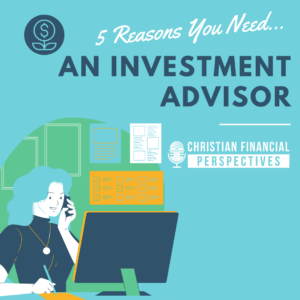Click below to listen to Episode 118 – 5 Reasons You Need An Investment Advisor
Subscribe: Apple Podcasts | Google Podcasts | Spotify | Amazon Music | Stitcher | RSS | More
118 – 5 Reasons You Need An Investment Advisor
In this episode, Bob and Shawn continue our series on “5 Reasons You Need…” by discussing the reasons that you need an investment advisor. Sometimes, it seems like you can go it alone when you hear about all of the day traders out there and advertisements that make investing look easy. However, there’s a lot that goes into it, which is why you need a registered investment advisor to help you along your financial journey.
Proverbs 15:22 states, “Plans fail for lack of counsel, but with many advisers they succeed.” A good advisor monitors your portfolio and helps you stay on track with your financial goals. We are here to help and try to take the confusion out of investing. So, listen in to see just 5 of the many reasons why you need an investment advisor!
HOSTED BY: Bob Barber, CWS®, CKA®
CO-HOST: Shawn Peters
Mentioned In This Episode
Want to ask a question about your specific situation? Schedule a complimentary 15 minute phone call.
EPISODE TRANSCRIPT
[INTRODUCTION]
Welcome to “Christian Financial Perspectives”, where you’re invited to gain insight, wisdom and knowledge about how Christians integrate their faith, life and finances with a Biblical Worldview. Here’s your host Christian Investment Advisor, Financial Planner, and Coach, Bob Barber.
[EPISODE]
Shawn:
Well, welcome back to Christian Financial Perspectives. It’s gonna be episode 118, right? Bob?
Bob:
We’re getting up there.
Shawn:
Yeah, we’re getting up there.
Bob:
Yeah, we are, of course the first, what, hundred of them were podcast. And now we’re getting into videos. So if you’re watching our videos, you can go back and listen to all of those audio versions of Christian Financial Perspectives.
Shawn:
Video has been a little different too. Gotta worry about the lighting. Gotta worry about your stage makeup.
Bob:
Gotta worry about making sure you’re wearing the right shirt, your hair is right.
Shawn:
Although we haven’t actually gotten into the stage makeup yet.
Bob:
Yeah, no we haven’t.
Shawn:
So if anyone’s watching this in 4k, hopefully we look alright. So what have we got for today, Bob?
Bob:
Five reasons you need an investment advisor. Now, we’re kind of in the middle of our fives. Remember we’re gonna do the triple five. So, our last episode was five reasons you need a financial planner. Today is five reasons you need an investment advisor and the next one’s gonna be five reasons you need a Christian financial advisor.
Shawn:
All right. Sounds good. Well kind of goes with our Christian financial advisors. That’s our name. It is.
Bob:
Isn’t that a good looking sign? Your wife did that logo, and I love that logo. That’s the word of God. And that has to do with Ecclesiastes 11:2, “Give your portions of seven. Yes, to eight, because you do not know what disaster become upon the land.”
Shawn:
You’ve got the Bible as the foundation.
Bob:
You got it. Now you know what our logo stands for.
Shawn:
It actually has some meaning.
Bob:
I’m sure you wanted to know, right?
Shawn:
Oh yeah. It was actually the top question everybody’s asking in comments. So let’s start with a scripture. Bob, you want to read Proverbs 15:22?
Bob:
You’ve heard me quote that one a few times.
Shawn:
I’ve heard a few times.
Bob:
I don’t even have to look at it. “Plans fail for lack of counsel, but with many advisors they succeed.” Don’t go it alone, basically. It’s what it’s saying.
Shawn:
Now you said you didn’t have to look at it. How’s our audience not know you didn’t have a teleprompter.
Bob:
Because I don’t, but I do have my computer right here. Okay. It helps us.
Shawn:
Well, let’s go into number one – risk analysis.
Bob:
This is where an investment advisor will help. First of all, you’ve gotta understand what risk is, and there’s risk and reward. And when you’re investing, you’re gonna have a roller coaster ride. Of course, the more conservative you go, it’s gonna be more like this. The more aggressive you go, it’s gonna be more ups and downs like this, but a good investment advisor can help you understand that. And we use a program called Riskalyze that basically goes from a scale from zero to a hundred. And it’s like, if you fall right in the middle, that’s what we call a balanced investor or a moderate investor. That would be like a score of 50-55, right in there. A Score like 20 would be more conservative. Of course that’s gonna be like your ultra conservative. And so it has to do with the portfolios that we’ll talk about here in just a minute, the different portfolios and how we can invest you and how much up and down tolerance you can take, especially right now in this crazy bear market that we’re in. What’s your time horizon? And what’s your risk score? And everybody’s risk score is different. I mean, I’ve seen somebody that’s 75 have a risk score of 80-85. I’ve seen somebody that’s 30 have a risk score of 30 or 20. So, everybody’s risk score is different.
Shawn:
But understanding that is key on or in investing correctly because it doesn’t really matter what your age is, that risk comes into what is that individual investor household? What are they comfortable with on the downside, because you can’t have the upside without the downside risk.
Bob:
You can’t? You can’t have the upside without the downside?
Shawn:
Well that is for another topic. We’ll cover the dangers of fixed index annuities. We’ll have to cover that one.
Bob:
Oh, okay. But that seems to be what everybody wants. They want all the upside, but they don’t realize there’s a downside. And risk is reward. So if you want greater reward, you take greater risk.
Shawn:
But that again comes into it. We ascertain what is the actual risk that an investor is comfortable with? Because they have to have some risk that they’re comfortable with. And then from there we can help them figure out, all right, well, what is the best placement for investing them according to what they’re comfortable with and what their goals are? Which, I believe, goes right into number two – short and long-term investment goals.
Bob:
It does. So a good investment advisor. You notice I say a good investment advisor, right? Okay. they’re gonna look at what your different investment objectives are and categorize your portfolio, too, because you can have a portion of your portfolio that you’re gonna want for the next one or three years.
Bob:
But then there’s a portion of the portfolio that you say, well, I’m not gonna touch that for 10 plus years or even 20 to 25 years. There’s short term goals and there’s long term goals and there’s mid midterm goals. And usually, the long term goals, I mean, if somebody is 30 years old and they’re wanting to retire at 60, well, that’s a long term goal. So that money could be more aggressive if the risk tolerance can take it, but then you may have a short term goal, maybe you’re in your thirties and you have a child that’s gonna be going to college in the next 10 years. That’s a shorter term goal, or the next five years. Of course, if you’re 58 and you’re gonna retire at 60 or you’re 60 and you’re gonna retire at 62, that is short term money. So all those different investment goals go with a financial plan as well and where are you on the roadmap?
Shawn:
And again, it’s not just based on how old are you, therefore, this is your risk, because I know you’ve talked about that before. That used to be kind of the old school of, well, if you’re in your twenties, then this is what you should be doing. If you’re in your forties or if you’re in your sixties, like, well, this is how you should invest, but it really comes down to, like you said, what is the timeframe? Is it a short term? Is it a long term? Because you could be 60 and have a long term goal, because we have clients that are set up where they don’t need more income than what they currently have. They are older they’re in their sixties or seventies, but they have a very aggressive strategy for maybe one of their accounts because they’re intending that for their kids or their grandkids.
Bob:
That’s exactly what I was gonna say. You we’re thinking along the same route. I have some grandfathers and grandmas and grandparents that want to give a large sum, later, to their great grandchildren or grandchildren. That’s a 20-25 year time horizon. Okay.
Shawn:
So even though the client is older and you would think, oh, they shouldn’t be aggressive because they’re old. Who knows how much longer they have, but it makes sense that they have a long term goal because it’s not for them. It’s for another generation.
Bob:
That’s right. So the third thing is a good investment advisor is about diversification and asset allocation. Okay. I said that kind of fast. Diversification and asset allocation.
Shawn:
Say it five times fast. I’m just kidding.
Bob:
Yeah, that’ll get you. That’s a tongue twister, but this is about building a portfolio based on different goals and objectives using different asset allocation models. We build our models here. We have five models and those models are very actively traded. And we look at different sectors of the economy like technology, real estate, energy, healthcare, shipping, transportation, financial companies, utilities, and the list goes on. So you build that diversification amongst all those different sectors, as well as diversifying in companies by size, revenue, profitability, price to earning ratios, we call it the PE ratio. And we build that across many stocks and bonds and ETFs and mutual funds. So, a good investment advisor is going to look at all of that. There’s a lot to it.
Shawn:
A few items to look at is what you’re saying.
Bob:
It takes a while.
Shawn:
Number four, which I guess kind of goes right on track with after you’ve set your risk, you’ve got your objective – short and long term. You’ve got your diversification, we get into monitoring.
Bob:
How often do you hear or see me monitoring our portfolios in our markets?
Shawn:
How many hours are there in a day? When you’re not asleep.
Bob:
I was talking to Garrett today. He’s like you wake up at 2:30 in the morning? Many times I do. And I go, I can’t get to sleep until I know what are the international markets doing? So I’ll get up, look at what the international markets are doing, what the futures are doing, and then I can go back to bed. It’s crazy. And I love doing this. Shawn, if you start asking me about who’s popular in Hollywood or what music is popular, I don’t know.
Shawn:
That’s okay. I don’t know either.
Bob:
But I know what’s going on in the financial markets and I love the financial markets, and I really never wanna retire because I love the financial markets so much. It’s because my high energy. You have the high energy, too. And that monitoring. We’re monitoring the markets on a daily, weekly, monthly basis for risk and reward. We look at short term and long term investment opportunities for your portfolios in all the different sectors, too. Overweighting or underweighting different sectors. Overweighting, underweighting large cap or small cap. I mean, it just goes on and on.
Shawn:
But it’s not for the purposes of day trading.
Bob:
No, it’s not that.
Shawn:
What we’re looking at that is we are still looking at a longer term. We’ve got one to three years, three to five years, five to six, eight years, ten years, we have these different primary strategies that we’re monitoring. But when we’re looking at that daily, weekly, monthly, it’s more to see the overall trends on if we’re in a bear market, do we see that the trends are starting to reverse, maybe we’re getting back into a bull market or if we’re in a bull market and it looks like, is it getting overheated.
Bob:
Is it getting overvalued?
Shawn:
Exactly. We might start turning down. So those are the things that we’re really looking for. Not the way you would hear, like on CNBC, they say, oh, the traders or the investors, what you mean? The day traders.
Bob:
I know. They call them investors and they’re traders because they’re trading every single day. We do not trade every day.
Shawn:
Or within the same day. That’s not how we look at it.
Bob:
But we do tweak our portfolios a little bit by a percent here or 3% here or so. That can be on a weekly or monthly or even a bimonthly basis. I’ve had people say, well, how often do you rebalance? We rebalance as needed. It depends on how fast the markets are moving. And then the fifth one for today, and believe me, there’s five today we’re covering, just like we covered on financial planning. When you’re looking at investment advice, there could be 50 areas. We could talk about this for two or three hours and I love talking about it, too. It make your head nearly feel like it’s gonna split open. When I talk to people, they’re like, okay, I get it, but I love this stuff. Okay What’s the number 5?
Shawn:
Number five is to stay on track.
Bob:
Oh yeah. I’m telling you, I think that our main job, Shawn, and we’re registered investment advisors, one of our main jobs is to help people keep emotions out of investing. Emotions and investing go together like oil and water.
Shawn:
So they don’t mix.
Bob:
They do not mix. You should not allow your emotions to have a part of investing. Garrett, I’d like you to put up the emotions chart. If you could do that and just let that stay up there a little bit and let people see. Because if you look at the emotions at the peak of the market, everybody wants to get in. And when it goes down, everybody wants to get out. And when everybody’s wanting to get out, that’s when the guys like Warren Buffet are just coming in and going, thank you people I’m getting to buy these stocks on sale. But for some reason, it’s the human tendency. Humans wanna buy everything on sale except stocks. And I don’t get that.
Shawn:
I know. I know. But that’s the way it is. Well, like cars. I know that’s been a hot topic for the last couple years.
Bob:
It’s always a hot topic with both of us, right? Yeah. We talk about cars a lot around here.
Shawn:
But the used car market has been crazy high. You can’t get a new car hardly at all. And so, if all of a sudden you went to the dealer and they said, well, not only do we have the car in stock that you wanted and it’s brand new, but I can actually give it to you for 20% off MSRP, who wouldn’t say yes please.
Bob:
Yeah.
Shawn:
But you’re right. When it comes to the markets, the emotions of investors, many times betray them and they end up doing the opposite of what they should be doing. And so when we’re having, especially a bear market, and I know you can attest to this, our main job when interacting with clients is helping them to manage their emotions in this time and realize in the grand scheme of things, are you on track? And if you’re still on track for your goals, just take a deep breath and breathe it out.
Bob:
Exactly. And many times it’s better not to look. Okay. I mean, you’re on a rollercoaster. We talked about this a few weeks ago. You don’t wanna jump off the rollercoaster when it’s doing this.
Shawn:
It’s dangerous.
Bob:
So those are just five of the many reasons you need a good Registered Investment Advisor. And like I said, we could take a few hours talking about this, and we want to do that with you on a one-on-one basis. Just like we said about financial planning…
Shawn:
Don’t go it alone.
Bob:
Don’t go it alone. Two are better than one. Share that scripture again that we love.
Shawn:
Well, as scripture says in Ecclesiastes 4:9-10, “Two are better than one because they have a good return for their labor. If either of them falls down, one can help the other up, but pity anyone who falls and has no one to help them up.”
Bob:
We’re here to help you.
Shawn:
God bless, and thank you for joining us.
[CONCLUSION]
That’s all for now.
We invite you to listen to all of our past episodes covering many financial topics from a Christian Perspective. To make sure you don’t miss any of Bob’s upcoming episodes you can subscribe to Christian Financial Perspectives on iTunes, Google Play Music, Spotify, or Stitcher. To learn more about integrating your faith with your finances, visit ciswealth.com or call 830-609-6986.
[DISCLOSURES]
Investment advisory services offered through Christian Investment Advisors Inc dba Christian Financial Advisors, a registered investment advisor registered with the SEC. Registration as an investment advisor does not imply a certain level of skill or training. Comments from today’s show are for informational purposes only and not to be considered investment advice or recommendations to buy or sell any company that may have been mentioned or discussed. The opinions expressed are solely those of the hosts, Bob Barber and Shawn Peters, and their guests. Bob and Shawn do not provide tax advice and encourage you to seek guidance from a tax professional. While Christian Financial Advisors believes the information to be accurate and reliable, we do not claim or have responsibility for its completeness, accuracy, or reliability.












